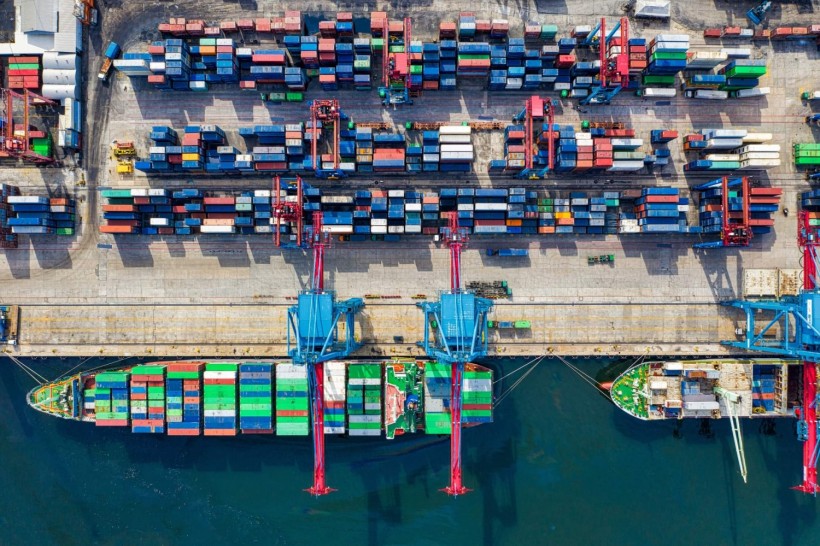We are witnessing the global supply chain fall apart in real-time. While the common denominator of the problem is COVID-19, many logistical issues could have been solved with a more efficient, digitalised supply chain. We discussed this with Shamayun Miah. He has worked in the technology industry, helping companies digitalise their business model using Artificial Intelligence, Automation and Cloud Computing. Miah said that utilising AI, ML, and big data can dramatically change logistics, creating a more robust and resilient supply chain.
The pandemic exacerbates the challenges we face today; however, the need to digitalise has been apparent for decades. Consumers have been moving away from physical stores to online channels globally. We have seen this in the banking sector and retail industry. They recognise they have choice and price advantages online. Now that face-to-face interactions are limited, and internet usage is up 60% in some countries, the supply chain is forced to play catch-up. While we are currently in a supply chain crisis with no end in sight, the shift to digital solutions will create a more dependable, efficient global economy in the future.
Digitalisation Before COVID-19
Before the pandemic, digitalisation across the global economy was steadily increasing. As a result, more companies started moving their supply chain workload to hyperscalers, implementing artificial intelligence and cloud-based solutions into their infrastructure to keep up with rising demand and offer more transparency within individual supply chains, said Miah
Companies that offer direct-to-consumer products were thriving before COVID-19 lockdowns. But because everyone was forced to participate in the economy digitally. Service providers like Amazon, Doordash, and Netflix were experiencing growth before COVID-19 because people found value in digital solutions to products, food, and entertainment. Each company offers convenience and speed in its services that many consumers already find appealing. Going into lockdown only accelerated the demand for digitisation.
Why are We Experiencing a Supply Chain Crisis in 2021?
A recent study has shown that almost 100 per cent of retailers had experienced production and logistic issues, and 91 per cent experienced supplier issues. There is a universal acknowledgement amongst executives that the current supply chain systems and operating model is not fit for an uncertain future.
After COVID-19 disrupted the world economy, we experienced initial shortages in essential goods due to panic buying and over-purchasing. These occurrences are easy to understand; we have a system designed to limit waste and maximise profits. Suppliers were not prepared for pasta, toilet roll and PPE shortages in the early days of the pandemic. A year later, we are still facing shortages in food, energy, and consumer goods. Today's issues are caused initially by COVID-19, later by Brexit but are much more complex than the problems we experienced in the early days of the pandemic.
In the UK we have experienced massive delays and shortages of goods, including empty supermarket shelves, petrol pumps, constructions materials, electronic parts amongst other things. Shortage and delivery delays are becoming a regular part of life, which will only worsen unless we fully digitise our supply chain.
The economies in major cities opened back up Spring of 2021. Consumers that had exclusively been purchasing products online now had retail options once again. Suppliers struggled to accommodate both sectors of the economy. For example, when restaurants opened back up, butchers and grocery stores failed to accommodate the rise in demand. As a result, we saw global meat shortages in the summer of 2021. Our outdated supply chain cannot respond to a sudden policy change allowing for new sources of revenue. Hiring additional workers laid off during the pandemic at meat processing facilities takes weeks, if not months. Scheduling trucks to handle shipping is impossible when the economy is overwhelmed with eCommerce deliveries.
Digital Solutions to Accommodate the Modern Economy
While some supply chain challenges are not solved by digitalisation alone, advanced analytics, artificial intelligence and cloud computing can provide massive relief to outdated systems, according to Shamayun Miah.
Predictive Analytics Using Artificial Intelligence and Machine Learning
Technology research firm Gartner expects supply chain organisations to double their machine automation processes in the next five years. Artificial intelligence and machine learning offer predictive modelling to solve problems much faster and more efficiently than humans. Advanced analytics and artificial intelligence provide the speed that's desperately needed to modernise supply chains. When adequately executed, AI and ML solutions speed up decision-making capabilities, reduce cycle times, boost productivity in operations, and quickly identify areas that need improvement.
Modern Digital supply chain systems offer logistics businesses an AI-driven platform to automate operations and maximise output. Artificial intelligence supply chains can help to deliver optimisation capabilities required for more accurate capacity planning, improved productivity, high quality, lower costs, and greater output, all while fostering safer working conditions.
Predictive analytics is not the end solution to potential future meat shortages, but predictive analytics algorithms offer the speed and accuracy needed to accommodate sudden shifts in the industry. Had our supply chains been more digitalised throughout the pandemic, we may not be still dealing with meat shortages today.
Cloud-based Logistics Platforms
Consumers expect more visibility and an optimised user experience when ordering products online. Implementing AI and cloud-based solutions into shipping gives the consumer an accurate view of the journey of their products from the factory to their doorstep.
Implementing cloud computing into the supply chain also gives suppliers, and manufacturers added visibility and control. We see a gap in factories and global suppliers, causing disruptions in the supply chain. In the US, even companies that manufacture their products domestically have limited access to the materials, chemicals, and equipment needed because they are produced abroad. Integrated cloud computing solutions that span across the supply chain can locate products at any shipping stage and identify potential bottlenecks and delays. AI and analytic-based platforms can predict supply, demand, and logistics issues before they happen so that proactive actions can be taken.
Again, implementing digital platforms will not solve all our current problems; we are in unprecedented times with many factors adding to the supply chain crisis. However, digital solutions like cloud computing, artificial intelligence and logistics platforms provide the visibility and speed needed to accommodate the increasingly complex global economy.
Could Blockchain Technology Solve Gaps in the Supply Chain?
Another attractive digital solution to the problems we are currently facing is blockchain technology. A great example is demonstrated in Ethiopia's coffee production industry. In the past, only 10% of the profit from a cup of coffee made its way back to the bean producers. Moyee Coffee, in partnership with the FairChain Foundation, is using blockchain technology to provide coffee manufacturers visibility in the supply chain. Since implementing these solutions, the Ethiopian farmers have seen their share increase to over 30%.
Blockchain offers visibility to aspects of the supply chain that have been traditionally left out. As a result, everyone has access to the same information improving and limiting constant communication. In addition, data is more accurate, and more minor errors occur because it's validated in real-time on the blockchain.
The Future of Commerce
The solution to the supply chain crisis is complex and will not be solved by digitalisation alone. However, the current situation will force companies to use digital solutions to remain competitive. Our supply chain's future has always been digital, but industries take decades to evolve. The rapid digitalisation caused by COVID-19 will result in a more efficient, reliable supply chain that is more prepared to handle a future crisis. We need to reset our supply chain for the next normal, said Shamayun Miah
© 2024 NatureWorldNews.com All rights reserved. Do not reproduce without permission.
* This is a contributed article and this content does not necessarily represent the views of natureworldnews.com






